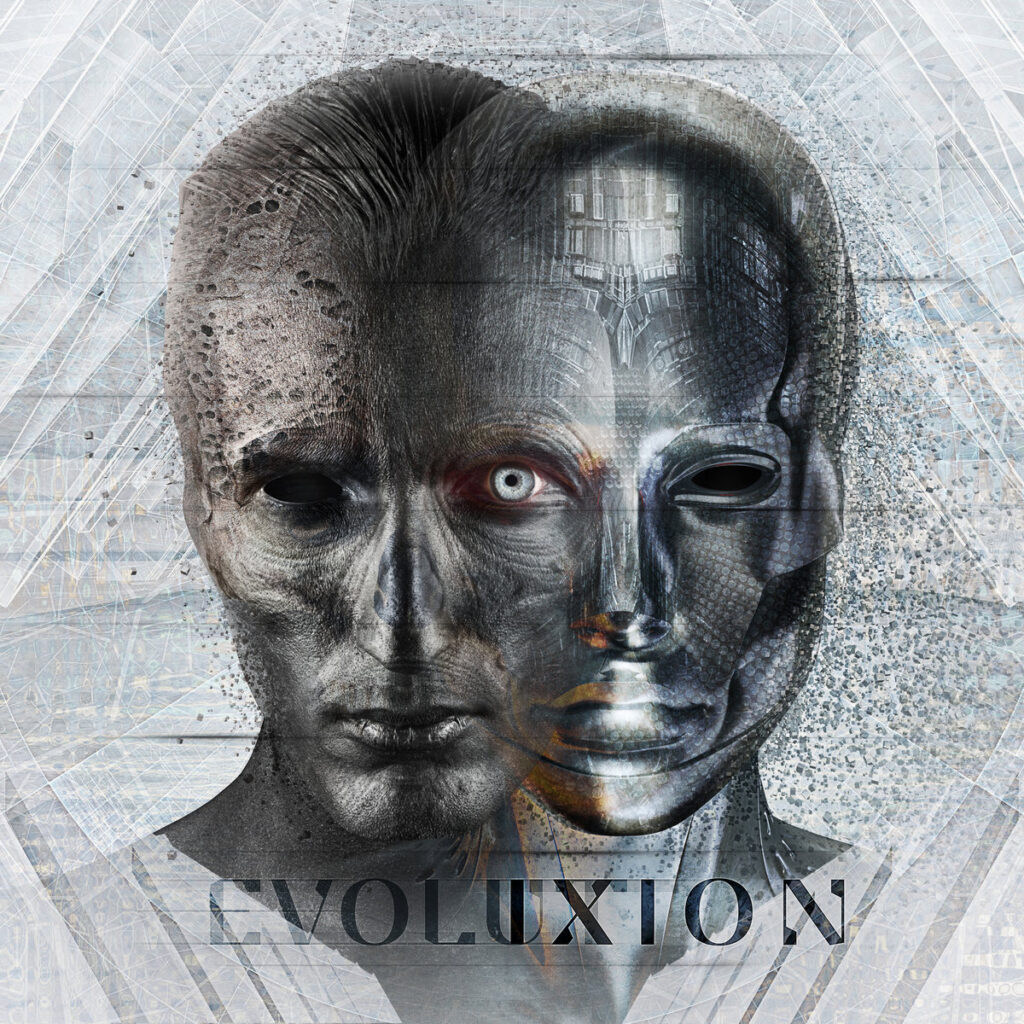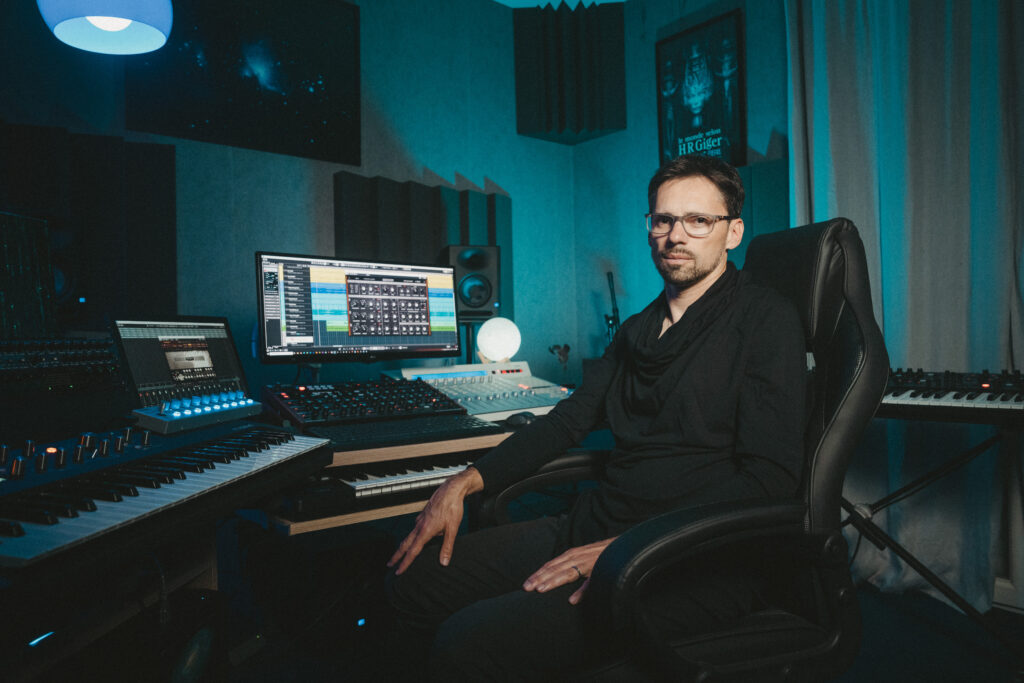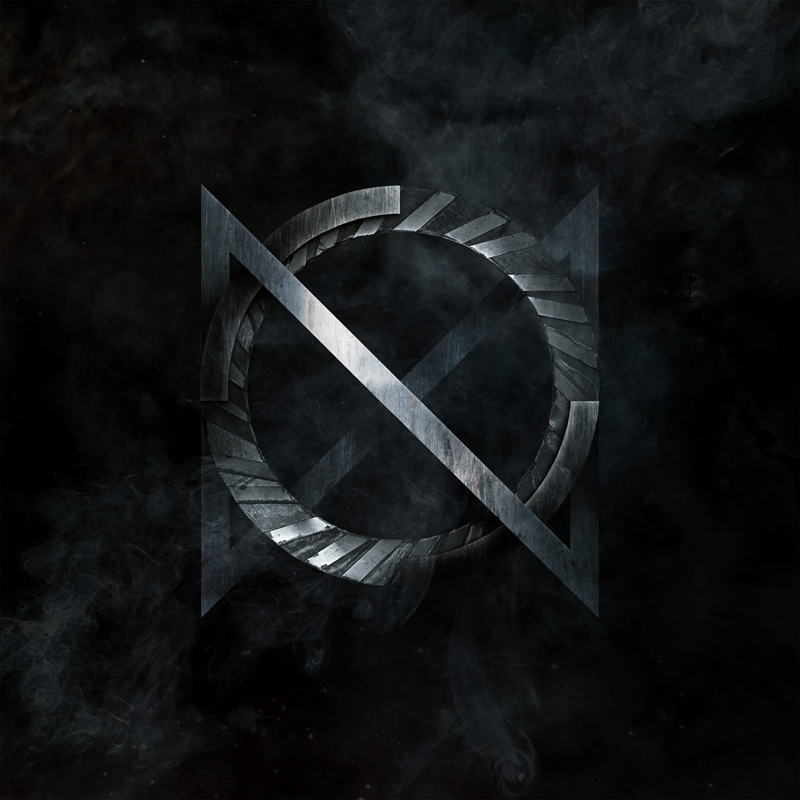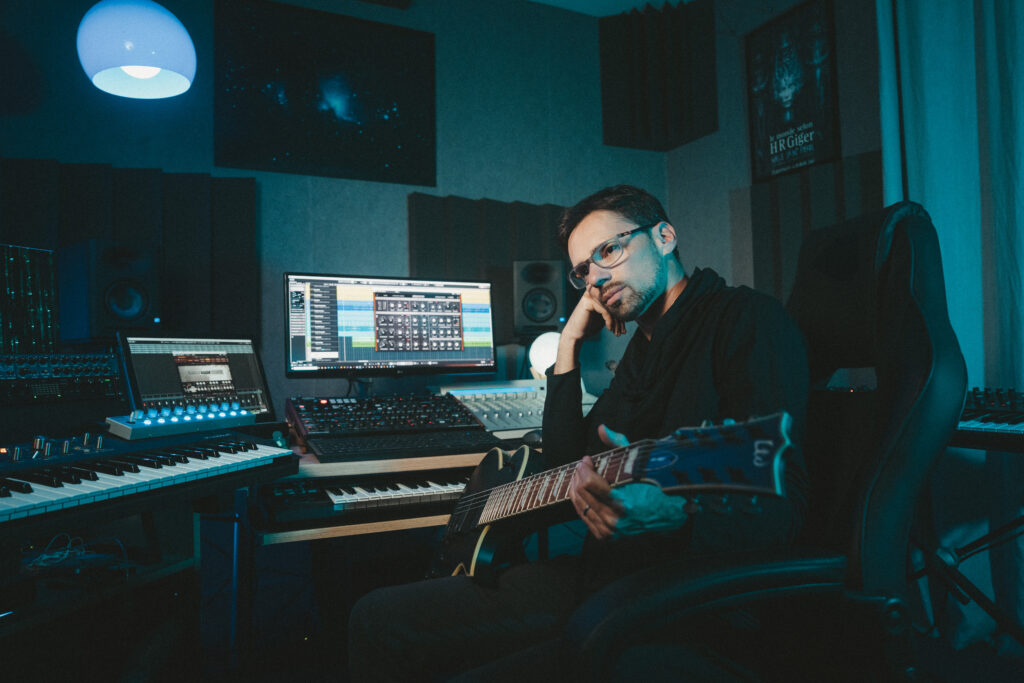French experimental project IXION has been celebrated for its ability to merge the ethereal with the heavy, creating a fusion of atmospheric doom metal with ambient and electronic influences. At the helm of this creative endeavor is songwriter and producer Julien Prat, whose vision has guided IXION through an ever-evolving sonic journey.
With their latest opus, Evolution, IXION delves into profound themes of humanity, androids, and post-humanism, presenting a conceptual trilogy that spans mortality, technological ascension, and the synthesis of man and machine. Released as three distinct EPs—Extinction, Restriction, and Regeneration—and later combined into a full-length album, Evolution challenges listeners with its intricate narrative and genre-defying soundscapes.
In this interview, Julien Prat offers insight into the creation of Evolution, the thematic depth behind its three-part structure, and the collaborative efforts that bring IXION‘s music to life. He also reflects on the project’s evolution since its inception, the enduring influence of science fiction, and the balancing act of being a multi-instrumentalist, composer, and producer. Join us as we journey through the fascinating world of IXION.
IXION’s music has always explored deep and complex themes. What drew you to the concept of humanity, androids, and post-humanism for Evolution?
Well, I think it came initially from a desire to make a music that could illustrate the world of robots and androids. I am quite a big SF reader and this is a field we had not yet really explored and I was quite excited to bring some musical influences like the Blade Runner soundtrack in our doom metal universe.
Then, realizing it could be a very electronic-orientated work, I got the idea to broaden the concept to both humans and post-humans, turning the album into a three-part work, and pushing further the stylish exercise : orchestral and acoustic sounds beside the doom metal for humans (forbidding myself to use electronic sounds for this first part), on the contrary a very electronic approach of doom for the androids, and finally a synthesis and hybrid doom for the post-humans. Post-humanism can be a very phantasmagorical theme : how far will humans go to enhance themselves ?
The decision to release Evolution as three separate EPs before the full album is intriguing. What inspired this approach, and how do you think it impacts the way listeners experience the story?
Quite early during the process and because of the different musical identities, we thought that each part could and deserves to exist alone, with its own artwork. So it led to three digital releases. For the listeners, depending on their tastes, it is perhaps an opportunity to focus on a more orchestral atmospheric experience, or on the contrary on an electronic sci-fi trip…
Of course the three parts brought together reveal the whole story and musical journey, and this is why the physical release was only for the album, with a final artwork and a global digital release. We hope most listeners will enjoy the entire album, but we find interesting to get two ways to enjoy Evolution : part by part, or as a whole.

Each part of Evolution—Extinction, Restriction, and Regeneration—has a distinct musical identity. How did you ensure these differences while maintaining a cohesive narrative?
The differences were really part of the concept, and as I said above a voluntary stylish exercise. For each part we used a different range of sounds to complement the doom base : orchestral sounds, organ, acoustic guitars on Extinction ; analog synths sounds and vocoder on Restriction ; a combination of all this stuff on Regeneration, with also unusual time signatures for us, in order to illustrate the strangeness of post-humans.
The cohesion came naturally I think, because even if we worked on these differences, our identity and sensibility are reflected through all the album, like a bridge across the 3 parts.
Extinction explores mortality in the face of rising android technology. What themes or emotions were you most keen to capture in this chapter of the album?
This is really about our human condition : we are mortal beings, afflicted by death, loosing our beloved ones, whatever we do we experience loss, mourning… and we can also be jealous and fearful toward strangers (here the androids). But in the middle of this dark existence there is also light : reaching out to others, loving, and a powerful thirst for life ! We tried to turn those ideas into music.
Restriction takes on a more electronic approach to doom metal. What influenced this shift in sound, and how did works like Blade Runner impact the creative process?
I wanted a soundtrack to robots and androids life : the sound had to shift totally when you start to listen to Restriction. And the Vangelis/Jarre/Schulze sound is both a great influence for me, and partially an illustration of androids in the collective mind, thanks to Blade Runner or even Kraftwek. It is also true for the vocoder of course, and it was quite fun to create a vocoded growl!
In Regeneration, you imagine the fusion of human consciousness with biotechnological bodies. How did you approach writing music for such a transformative concept?
There were two points here: taking into account that post-humans are a fusion of humans and androids (or very enhanced humans), it was quite logical to bring together all the array of sounds of the first two parts. We tried to compose synth sequences responding to guitar or piano arpeggios for example, or synth sounds spiking the organ.
Furthermore, post-humans are new and quite strange beings – we thought it would be interesting to build songs with alternative structures, rhythm, and time signatures.

The blending of orchestral and electronic influences in Evolution is striking. How do you balance these elements to create IXION’s signature atmospheric doom metal sound?
Thank you! Well it is quite a natural process for me, somehow difficult to explain…
It is a combination of the genres that I like the most, and I love to add them layer after layer, like a painting, a mosaic, playing with shades. I must notice that for me the composition is inseparable from the production (I mean a significant part of the instruments recording and programming, and even a kind of pre-mixing) which helps me to get this balance. IXION’ music is loaded with lots of layers but thanks to this process, each instrument, element, finds its place and the whole is breathing.
The lyrics for The Laws of Life incorporate Isaac Asimov’s laws of robotics. What made you decide to include this homage, and how does it fit within the album’s story?
In the story, while humans are burdened by their mortality, androids are constrained by the laws of robotics… And we thought it could be great to introduce Restriction by those 3 laws, literally!
It was fun to set to music those well-known words ! And that’s why the song begins with 3 electronic beats, then 3 analog bass notes…
Yannick Dilly’s clean and rock vocals play a key role on the album. How do you collaborate to integrate his vocal style with your own growls and other vocals?
Yannick has quite a big range but for IXION we mainly work on two sides to fit the music: the clean, ghostly vocals to emphasize the ambient and melancholic moments,
and the powerful rock vocals to create epic passages. This is a great add to my growls (which are mainly for the dark moments).
I usually send to him the pre-produced songs a few weeks or months before our sessions, including my ideas for vocal lines. Then, when we meet, we challenge those lines, modify them, add new ones… The clean vocals are often harmonized with several different lines, while the rock ones are perhaps more simple, but with a work on the degree of power needed.
Science fiction has been a recurring influence in IXION’s music. What is it about this genre that resonates with you, and how does it shape your artistic vision?
It is strange but I think I came to science-fiction because of the music and not the contrary. I first fell in love with ambient electronic music, then metal and dark music, and when I discovered later some science-fiction books, it was like I finally found stories and images matching my musical tastes! Now it works in the two ways: a text can influence my music, or the opposite.
I am particularly attracted to vastness from an imaginary point of view : space, abyss… and the contemplative, exploratory films or books really grab my attention. It is more about landscapes, technology, psychology than action or sociological fictions.
Over the years, IXION has evolved significantly, both musically and conceptually. How do you reflect on the project’s journey since its beginnings in 2004?
I’d say we have remained faithful to the original idea to bring some ambient and electronics into a more classical atmospheric doom metal, but at the same time we have evolved, taking on a kind of progressive approach : the place of synths/keys is well established, the vocals are varied and not typically doom or metal (except the growls), the structure of songs is often not long (for doom metal) nor short… we have refined our identity, and since L’Adieu aux Etoiles our sound also. For this new album we have also worked a lot more on videos with both lyrics video and video clips with Hugo Le Beller.

With Evolution, you’ve undertaken the production, engineering, and mixing yourself. What were the biggest challenges of managing these aspects, and how did Tony Lindgren’s mastering elevate the final product?
The biggest challenge is to say “stop, now it’s ok, let’s send to the mastering”. As I am perfectionist and anxious, it could be an infinite process… There is a self-pressure when you’re alone with your production, especially for the mixing when you ‘freeze’ your work in its final form. It makes the collaborative moments even more joyful!
But this process is also the perfect way to take the time, to try, to find the right balance between the instruments, and make an album sound as the music I had in mind when composing.
IXION’s music has a lot of layers, it could be mud, so there is an interesting fine tuning to make them breathe.
The mastering is the final step to get the right balance between bass, mediums, trebles, to get the right power and level. It gives the final ‘colour’ and determines the listening experience (for the dynamic range for example). I realized a few years ago that I was fan of numerous albums produced and/or mastered at Fascination Street Studios: Amorphis, Dark Tranquillity, Moonspell, Paradise Lost, Swallow the Sun… There is something in the overall sound of these albums that speaks to me. I contacted Tony for L’Adieu aux Etoiles, and being totally happy with the result, we kept the formula for Evolution!
IXION has carved a unique niche within the doom sphere, blending ambient, electronic, and metal influences. How do you see this fusion evolving in future projects?
I think we will keep this fusion, because it reflects a combination of genres that I love, and it has become our identity. But inside this frame, there are plenty of variations possible. We can choose to be more on the doom side, or more on an ambient-post-rock side, etc… So probably we will make some themed albums, some more balanced ones, keeping to expand our universe !
L’Adieu aux Etoiles was highly praised and nominated for awards. Did its success influence your approach to creating Evolution?
Perhaps it gave us some courage to make choices a bit more daring, I mean about the three parts of Evolution and their musical differences. L’Adieu aux Etoiles was capturing the essence of our music, of this fusion you said. This album being very well welcomed, we felt more free after it to try things. And Evolution, in some ways, deconstructs the fusion, even if the third part Regeneration is a synthesis. But in any case, I think we would have finally unrolled the concept of Evolution.
For fans new to IXION, what do you think makes Evolution a standout entry point into your music?
This is a good question. Perhaps I should not say that, but I’m not sure this new album is the best entry point to discover IXION – L’Adieu aux Etoiles is more focused on our identity, more condensed also. But Evolution is a good way to understand the musical colors we are playing with ! Extinction can speak more to some people, Restriction to others. it shows the variations of our sound.
What role does French culture and your personal background play in shaping IXION’s sound and thematic direction?
For me the music is above all an escape, an imaginary world. This means that I don’t include ‘every day life’ in my approach. And the universes that I like are more marked by a genre than a local culture. For example if you take the cinema, I would say that I am more into genre movies than auteur movies. Something at the same time more universal and specific.
There is still a french artist that introduced me to music and atmospheric one especially: Jean Michel Jarre (before I discovered metal) – but this is one of the most international sparkling french artist. But there is a kind of European musical culture in his work and the bands and artist that I like.
As a multi-instrumentalist, songwriter, and producer, how do you approach balancing these roles to achieve your creative vision?
Working in my studio, all of those aspects are a kind of continuum. I can start composing with a guitar, a pad, a piano, and then add the different tracks. At any time I have in mind the direction and shades I want to get. I often work finely from the start on synths and drums, whereas the guitars and piano are pre-recorded, then re-recorded with attention when the composition is completed. At this stage I have sometimes imagined some vocals lines, but globally, the work on vocals starts after the music is done. I write lyrics and we go on with recording sessions. Finally the mixing.

With Evolution now complete, what are your plans for the future of IXION? Will live performances or further concept albums be part of the journey?
Concept albums certainly, this is something natural for me to have at least a theme when I start working on a new opus. Right now I have four albums or EP’s under preparation! I have to choose which one would be produced first.
Playing live is still something difficult: we cannot meet each other often with Yannick, and we’d have to find a complete line-up. I am also a bit dubious on the means available: for me a concert has to enhance the musical experience which implies, for a spatial music, a spatial staging… Not really easy for a small project with quite a specific audience.
Finally, what message or experience do you hope listeners take away from Evolution?
Well simply I hope Evolution to give our listeners an escape, in a musical, futuristic and imaginary world, full of sounds, images and emotions!
Listen to Evolution here. Like IXION on Facebook, and follow them on Instagram.

